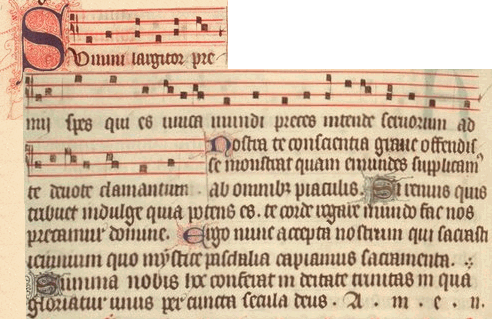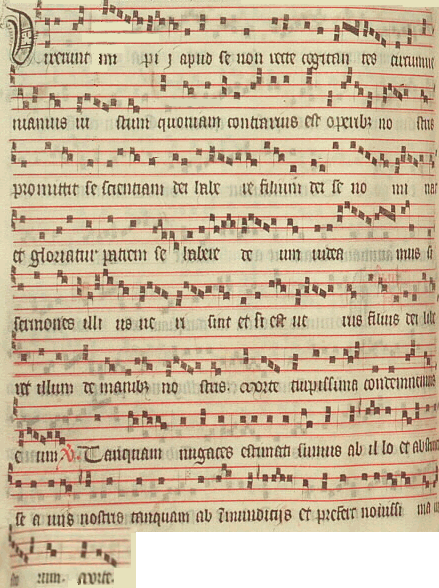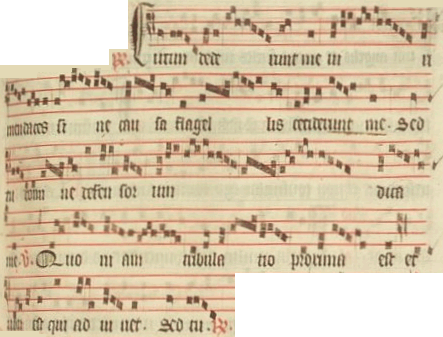READINGS: LENT FRIDAY II
שׁוּבוּ אֶל־יְהוָה אֱלֹהֵיכֶם —
כִּי־חַנּוּן וְרַחוּם הוּא Even Years: Exodus 19:1-19; 20:18-21
בַּחֹדֶשׁ
הַשְּׁלִישִׁי
לְצֵאת
בְּנֵי־יִשְׂרָאֵל
מֵאֶרֶץ
מִצְרָיִם
בַּיּוֹם הַזֶּה
בָּאוּ
מִדְבַּר
סִינָי׃ וַיִּסְעוּ
מֵרְפִידִים
וַיָּבֹאוּ
מִדְבַּר
סִינַי
וַיַּחֲנוּ
בַּמִּדְבָּר
וַיִּחַן־שָׁם
יִשְׂרָאֵל
נֶגֶד הָהָר׃
וּמֹשֶׁה
עָלָה
אֶל־הָאֱלֹהִים
וַיִּקְרָא
אֵלָיו
יְהוָה
מִן־הָהָר
לֵאמֹר כֹּה
תֹאמַר
לְבֵית
יַעֲקֹב
וְתַגֵּיד
לִבְנֵי יִשְׂרָאֵל׃ אַתֶּם
רְאִיתֶם
אֲשֶׁר
עָשִׂיתִי
לְמִצְרָיִם
וָאֶשָּׂא
אֶתְכֶם
עַל־כַּנְפֵי
נְשָׁרִים
וָאָבִא
אֶתְכֶם אֵלָי׃ וְעַתָּה
אִם־שָׁמוֹעַ
תִּשְׁמְעוּ
בְּקֹלִי
וּשְׁמַרְתֶּם
אֶת־בְּרִיתִי
וִהְיִיתֶם
לִי סְגֻלָּה
מִכָּל־הָעַמִּים
כִּי־לִי
כָּל־הָאָרֶץ׃ וְאַתֶּם
תִּהְיוּ־לִי
מַמְלֶכֶת
כֹּהֲנִים
וְגוֹי
קָדוֹשׁ
אֵלֶּה
הַדְּבָרִים
אֲשֶׁר
תְּדַבֵּר
אֶל־בְּנֵי
יִשְׂרָאֵל׃
וַיָּבֹא
מֹשֶׁה
וַיִּקְרָא
לְזִקְנֵי הָעָם
וַיָּשֶׂם
לִפְנֵיהֶם
אֵת
כָּל־הַדְּבָרִים
הָאֵלֶּה
אֲשֶׁר
צִוָּהוּ
יְהוָה׃ וַיַּעֲנוּ
כָל־הָעָם
יַחְדָּו
וַיֹּאמְרוּ
כֹּל
אֲשֶׁר־דִּבֶּר
יְהוָה
נַעֲשֶׂה וַיָּשֶׁב
מֹשֶׁה
אֶת־דִּבְרֵי
הָעָם אֶל־יְהוָה׃ וַיֹּאמֶר
יְהוָה
אֶל־מֹשֶׁה
הִנֵּה
אָנֹכִי בָּא
אֵלֶיךָ
בְּעַב
הֶעָנָן
בַּעֲבוּר יִשְׁמַע
הָעָם
בְּדַבְּרִי
עִמָּךְ
וְגַם־בְּךָ
יַאֲמִינוּ
לְעוֹלָם
וַיַּגֵּד
מֹשֶׁה
אֶת־דִּבְרֵי
הָעָם אֶל־יְהוָה׃ וַיֹּאמֶר
יְהוָה
אֶל־מֹשֶׁה
לֵךְ אֶל־הָעָם
וְקִדַּשְׁתָּם
הַיּוֹם
וּמָחָר
וְכִבְּסוּ
שִׂמְלֹתָם׃ וְהָיוּ
נְכֹנִים
לַיּוֹם
הַשְּׁלִישִׁי
כִּי
בַּיּוֹם
הַשְּׁלִישִׁי
יֵרֵד יְהוָה
לְעֵינֵי
כָל־הָעָם
עַל־הַר
סִינָי׃ וְהִגְבַּלְתָּ
אֶת־הָעָם
סָבִיב
לֵאמֹר הִשָּׁמְרוּ
לָכֶם עֲלוֹת
בָּהָר
וּנְגֹעַ
בְּקָצֵהוּ
כָּל־הַנֹּגֵעַ
בָּהָר מוֹת
יוּמָת׃ לֹא־תִגַּע
בּוֹ יָד
כִּי־סָקוֹל
יִסָּקֵל
אוֹ־יָרֹה
יִיָּרֶה
אִם־בְּהֵמָה
אִם־אִישׁ
לֹא יִחְיֶה
בִּמְשֹׁךְ
הַיֹּבֵל הֵמָּה
יַעֲלוּ
בָהָר׃
וַיֵּרֶד
מֹשֶׁה
מִן־הָהָר
אֶל־הָעָם
וַיְקַדֵּשׁ
אֶת־הָעָם
וַיְכַבְּסוּ
שִׂמְלֹתָם׃ וַיֹּאמֶר
אֶל־הָעָם
הֱיוּ
נְכֹנִים
לִשְׁלֹשֶׁת
יָמִים
אַל־תִּגְּשׁוּ
אֶל־אִשָּׁה׃
וַיְהִי
בַיּוֹם
הַשְּׁלִישִׁי
בִּהְיֹת הַבֹּקֶר
וַיְהִי
קֹלֹת
וּבְרָקִים
וְעָנָן
כָּבֵד
עַל־הָהָר
וְקֹל שֹׁפָר
חָזָק מְאֹד
וַיֶּחֱרַד
כָּל־הָעָם
אֲשֶׁר
בַּמַּחֲנֶה׃ וַיּוֹצֵא
מֹשֶׁה
אֶת־הָעָם
לִקְרַאת
הָאֱלֹהִים
מִן־הַמַּחֲנֶה
וַיִּתְיַצְּבוּ
בְּתַחְתִּית
הָהָר׃ וְהַר
סִינַי
עָשַׁן
כֻּלּוֹ
מִפְּנֵי אֲשֶׁר
יָרַד עָלָיו
יְהוָה
בָּאֵשׁ
וַיַּעַל עֲשָׁנוֹ
כְּעֶשֶׁן
הַכִּבְשָׁן
וַיֶּחֱרַד
כָּל־הָהָר
מְאֹד׃ וַיְהִי
קוֹל הַשּׁוֹפָר
הוֹלֵךְ
וְחָזֵק
מְאֹד מֹשֶׁה יְדַבֵּר
וְהָאֱלֹהִים
יַעֲנֶנּוּ
בְקוֹל׃...
וְכָל־הָעָם
רֹאִים
אֶת־הַקּוֹלֹת
וְאֶת־הַלַּפִּידִם
וְאֵת קוֹל
הַשֹּׁפָר
וְאֶת־הָהָר
עָשֵׁן
וַיַּרְא
הָעָם וַיָּנֻעוּ
וַיַּעַמְדוּ
מֵרָחֹק׃ וַיֹּאמְרוּ
אֶל־מֹשֶׁה
דַּבֵּר־אַתָּה
עִמָּנוּ
וְנִשְׁמָעָה
וְאַל־יְדַבֵּר
עִמָּנוּ
אֱלֹהִים
פֶּן־נָמוּת׃ וַיֹּאמֶר
מֹשֶׁה
אֶל־הָעָם
אַל־תִּירָאוּ
כִּי
לְבַעֲבוּר
נַסּוֹת
אֶתְכֶם בָּא
הָאֱלֹהִים
וּבַעֲבוּר
תִּהְיֶה
יִרְאָתוֹ
עַל־פְּנֵיכֶם
לְבִלְתִּי
תֶחֱטָאוּ׃ וַיַּעֲמֹד
הָעָם
מֵרָחֹק
וּמֹשֶׁה
נִגַּשׁ
אֶל־הָעֲרָפֶל
אֲשֶׁר־שָׁם
הָאֱלֹהִים׃
3 Moses then went up to God, and Yahweh called to him from the mountain, saying, 'Say this to the House of Jacob! Tell the Israelites, 4 "You have seen for yourselves what I did to the Egyptians and how I carried you away on eagle's wings and brought you to me. 5 So now, if you are really prepared to obey me and keep my covenant, you, out of all peoples, shall be my personal possession, for the whole world is mine. 6 For me you shall be a kingdom of priests, a holy nation." Those are the words you are to say to the Israelites.'
7 So Moses went and summoned the people's elders and acquainted them with everything that Yahweh had bidden him, 8 and the people all replied with one accord, 'Whatever Yahweh has said, we will do.' Moses then reported to Yahweh what the people had said. 9 Yahweh then said to Moses, 'Look, I shall come to you in a dense cloud so that the people will hear when I speak to you and believe you ever after.'
Moses then told Yahweh what the people had said. 10 Yahweh then said to Moses, 'Go to the people and tell them to sanctify themselves today and tomorrow. They must wash their clothes 11 and be ready for the day after tomorrow; for the day after tomorrow, in the sight of all the people, Yahweh will descend on Mount Sinai. 12 You will mark out the limits of the mountain and say, "Take care not to go up the mountain or to touch the edge of it. Anyone who touches the mountain will be put to death. 13 No one may lay a hand on him: he must be stoned or shot by arrow; whether man or beast, he shall not live." When the ram's horn sounds a long blast, they must go up the mountain.'
14 So Moses came down from the mountain to the people; he made the people sanctify themselves and they washed their clothes. 15 He then said to the people, 'Be ready for the day after tomorrow; do not touch a woman.'
16 Now at daybreak two days later, there were peals of thunder and flashes of lightning, dense cloud on the mountain and a very loud trumpet blast; and, in the camp, all the people trembled. 17 Then Moses led the people out of the camp to meet God; and they took their stand at the bottom of the mountain. 18 Mount Sinai was entirely wrapped in smoke, because Yahweh had descended on it in the form of fire. The smoke rose like smoke from a furnace and the whole mountain shook violently. 19 Louder and louder grew the trumpeting. Moses spoke, and God answered him in the thunder.
20:18 Seeing the thunder pealing, the lightning flashing, the trumpet blasting and the mountain smoking, the people were all terrified and kept their distance. 19 'Speak to us yourself,' they said to Moses, 'and we will obey; but do not let God speak to us, or we shall die.' 20 Moses said to the people, 'Do not be afraid; God has come to test you, so that your fear of him, being always in your mind, may keep you from sinning.' 21 So the people kept their distance while Moses approached the dark cloud where God was.
Odd Years: Deuteronomy 31:1-15,23
1 וַיֵּלֶךְ
מֹשֶׁה
וַיְדַבֵּר
אֶת־הַדְּבָרִים
הָאֵלֶּה
אֶל־כָּל־יִשְׂרָאֵל׃
3 Yahweh your God himself will lead you across, he himself will destroy and dispossess these nations confronting you; Joshua too will lead you across, as Yahweh has said. 4 Yahweh will treat them as he has treated Sihon and Og the Amorite kings and their country—he destroyed them. 5 Yahweh will put them at your mercy, and you will deal with them exactly as prescribed by the commandments which I have laid down for you. 6 Be strong, stand firm, have no fear, do not be afraid of them, for Yahweh your God is going with you; he will not fail you or desert you.'
7 Moses then summoned Joshua and, in the presence of all Israel, said to him, 'Be strong, stand firm; you will be the one to go with this people into the country which Yahweh has sworn to their ancestors that he would give them; you are to be the one who puts them into possession of it. 8 Yahweh himself will lead you; he will be with you; he will not fail you or desert you. Have no fear, do not be alarmed.'
9 Moses committed this Law to writing and gave it to the priests, the sons of Levi, who carried the ark of Yahweh's covenant, and to all the elders of Israel.
10 And Moses gave them this command, 'At the end of every seven years, at the time fixed for the year of remission, at the feast of Shelters, 11 when all Israel assembles in the presence of Yahweh your God in the place chosen by him, you must proclaim this Law in the hearing of all Israel. 12 Call the people together, men, women, children, and the foreigner residing with you, so that, hearing it, they may learn to fear Yahweh your God and keep and observe all the words of this Law. 13 Their children, who as yet do not know it, will hear it and learn to fear Yahweh your God, all the time you live in the country which you are crossing the Jordan to possess.'
14 Yahweh said to Moses, 'And now the time is near when you must die. Summon Joshua and take your places at the Tent of Meeting, so that I can give him his orders.' Moses and Joshua went and took their places at the Tent of Meeting, 15 and Yahweh showed himself at the Tent in a pillar of cloud; the pillar of cloud stood at the door of the Tent.
23 To Joshua son of Nun, Yahweh gave this order, 'Be strong and stand firm, for you are to be the one to bring the Israelites into the country which I have promised them on oath, and I myself shall be with you.'
Even Years: Irenaeus, Against heresies, Liber 4,16:1-5 (SC 100, 564-572)
Odd Years: John Fisher, On Psalm 101
Our mercyfull lorde... brought the people of Israell out of egypte so meruaylously with so many straunge tokens and wonders cau'sed them to passe a fote thrugh the reed see drye shodde, whiche sente downe from heuen aungelles fode & other wylde foule, curlewes, or quayles, caused water to flowe out of the harde stone for theyr relefe, gaue them vyctory of all theyr enemyes, made the flode of Iordane to leue his naturall course and turne backwarde, deuyded and parted the londe of behest accordynge to the nombre of the trybes and kynredes of Israell, so many as were ordeyned to haue possessyon, & so oftentymes had mercy on tghem after they commytted ydolatry, whiche also called vs vnto grace, where naturally we came of the gentyles and graffed vs in the very olyue tree of fayth, suffrynge the naturall bowes of it to be cut away, the olyue tree sygnefyeth the people of Iewes.
Last he spared not his owne sone but gaue hym in redempcyon for vs all, notwithstandynge we vnkynde & moost vnkynde without mesure take no hede, thynke not how moche charyte of god is shewed to vs, but forgete & in maner despise to folowe & do after our mercyfull lord for his grete merytes vpon synners. O tough & stely hertes, o herte more hard than flynt or other stone.
O grete vnkyndnes whereby we are made so ferre away from god, that it is meruayle & in maner aboue all meruayles to knowe him loke so ferre downe in to so grete extremite of ingratitude, therfore let these meruaylous benefeytes of god be wryten for a contynuall remembraunce of all crysten people to come after us.

Invitatory Psalm & BACK

PSALMS and BACK
1 Three months to the day after leaving Egypt, the Israelites reached the desert of Sinai. 2 Setting out from Rephidim, they reached the desert of Sinai and pitched camp in the desert; there, facing the mountain, Israel pitched camp.
2 וַיֹּאמֶר
אֲלֵהֶם
בֶּן־מֵאָה
וְעֶשְׂרִים
שָׁנָה
אָנֹכִי
הַיּוֹם
לֹא־אוּכַל
עוֹד לָצֵאת
וְלָבוֹא
וַיהוָה
אָמַר אֵלַי
לֹא תַעֲבֹר
אֶת־הַיַּרְדֵּן
הַזֶּה׃
3 יְהוָה
אֱלֹהֶיךָ
הוּא עֹבֵר
לְפָנֶיךָ הוּא־יַשְׁמִיד
אֶת־הַגּוֹיִם
הָאֵלֶּה
מִלְּפָנֶיךָ
וִירִשְׁתָּם
יְהוֹשֻׁעַ
הוּא עֹבֵר
לְפָנֶיךָ
כַּאֲשֶׁר דִּבֶּר
יְהוָה׃
4 וְעָשָׂה
יְהוָה לָהֶם
כַּאֲשֶׁר
עָשָׂה לְסִיחוֹן
וּלְעוֹג
מַלְכֵי
הָאֱמֹרִי
וּלְאַרְצָם
אֲשֶׁר
הִשְׁמִיד
אֹתָם׃
5 וּנְתָנָם
יְהוָה
לִפְנֵיכֶם
וַעֲשִׂיתֶם
לָהֶם
כְּכָל־הַמִּצְוָה
אֲשֶׁר
צִוִּיתִי
אֶתְכֶם׃
6 חִזְקוּ
וְאִמְצוּ
אַל־תִּירְאוּ
וְאַל־תַּעַרְצוּ
מִפְּנֵיהֶם
כִּי יְהוָה
אֱלֹהֶיךָ
הוּא
הַהֹלֵךְ
עִמָּךְ לֹא
יַרְפְּךָ
וְלֹא
יַעַזְבֶךָּ׃
פ
7 וַיִּקְרָא
מֹשֶׁה
לִיהוֹשֻׁעַ
וַיֹּאמֶר
אֵלָיו
לְעֵינֵי
כָל־יִשְׂרָאֵל
חֲזַק
וֶאֱמָץ כִּי
אַתָּה
תָּבוֹא אֶת־הָעָם
הַזֶּה
אֶל־הָאָרֶץ
אֲשֶׁר
נִשְׁבַּע
יְהוָה
לַאֲבֹתָם
לָתֵת לָהֶם
וְאַתָּה
תַּנְחִילֶנָּה
אוֹתָם׃
8 וַיהוָה
הוּא
הַהֹלֵךְ
לְפָנֶיךָ
הוּא יִהְיֶה
עִמָּךְ לֹא
יַרְפְּךָ
וְלֹא
יַעַזְבֶךָּ
לֹא תִירָא
וְלֹא תֵחָת׃
9 וַיִּכְתֹּב
מֹשֶׁה
אֶת־הַתּוֹרָה
הַזֹּאת
וַיִּתְּנָהּ
אֶל־הַכֹּהֲנִים
בְּנֵי לֵוִי
הַנֹּשְׂאִים
אֶת־אֲרוֹן
בְּרִית יְהוָה
וְאֶל־כָּל־זִקְנֵי
יִשְׂרָאֵל׃
10 וַיְצַו
מֹשֶׁה
אוֹתָם
לֵאמֹר
מִקֵּץ שֶׁבַע
שָׁנִים
בְּמֹעֵד
שְׁנַת
הַשְּׁמִטָּה
בְּחַג
הַסֻּכּוֹת׃
11 בְּבוֹא
כָל־יִשְׂרָאֵל
לֵרָאוֹת
אֶת־פְּנֵי
יְהוָה
אֱלֹהֶיךָ
בַּמָּקוֹם
אֲשֶׁר יִבְחָר
תִּקְרָא
אֶת־הַתּוֹרָה
הַזֹּאת נֶגֶד
כָּל־יִשְׂרָאֵל
בְּאָזְנֵיהֶם׃
12 הַקְהֵל
אֶת־הָעָם
הָאֲנָשִׁים
וְהַנָּשִׁים
וְהַטַּף
וְגֵרְךָ
אֲשֶׁר
בִּשְׁעָרֶיךָ
לְמַעַן
יִשְׁמְעוּ
וּלְמַעַן
יִלְמְדוּ
וְיָרְאוּ
אֶת־יְהוָה
אֱלֹהֵיכֶם
וְשָׁמְרוּ
לַעֲשׂוֹת
אֶת־כָּל־דִּבְרֵי
הַתּוֹרָה
הַזֹּאת׃
13 וּבְנֵיהֶם
אֲשֶׁר
לֹא־יָדְעוּ
יִשְׁמְעוּ
וְלָמְדוּ
לְיִרְאָה
אֶת־יְהוָה
אֱלֹהֵיכֶם
כָּל־הַיָּמִים
אֲשֶׁר
אַתֶּם חַיִּים
עַל־הָאֲדָמָה
אֲשֶׁר
אַתֶּם
עֹבְרִים
אֶת־הַיַּרְדֵּן
שָׁמָּה
לְרִשְׁתָּהּ׃
פ
14 וַיֹּאמֶר
יְהוָה
אֶל־מֹשֶׁה
הֵן קָרְבוּ יָמֶיךָ
לָמוּת קְרָא
אֶת־יְהוֹשֻׁעַ
וְהִתְיַצְּבוּ
בְּאֹהֶל
מוֹעֵד
וַאֲצַוֶּנּוּ
וַיֵּלֶךְ
מֹשֶׁה
וִיהוֹשֻׁעַ
וַיִּתְיַצְּבוּ
בְּאֹהֶל
מוֹעֵד׃
15 וַיֵּרָא
יְהוָה
בָּאֹהֶל
בְּעַמּוּד
עָנָן וַיַּעֲמֹד
עַמּוּד
הֶעָנָן
עַל־פֶּתַח
הָאֹהֶל׃...
23 וַיְצַו
אֶת־יְהוֹשֻׁעַ
בִּן־נוּן
וַיֹּאמֶר
חֲזַק
וֶאֱמָץ כִּי
אַתָּה
תָּבִיא אֶת־בְּנֵי
יִשְׂרָאֵל
אֶל־הָאָרֶץ
אֲשֶׁר־נִשְׁבַּעְתִּי
לָהֶם
וְאָנֹכִי
אֶהְיֶה
עִמָּךְ׃
1 Moses went and spoke to all Israel as follows, 2 'Today, I am one hundred and twenty years old, and can no longer act as leader. Yahweh has told me, "You shall not cross this Jordan."
Ὁ
Μωϋσῆς ἐν τῷ
Δευτερονομίῳ
φησὶ πρὸς τὸν
λαόν· Κύριος ὁ
Θεός σου διέθετο
διαθήκην ἐν
Χωρήβ· οὐχὶ τοῖς
πατράσιν ὑμῶν
διέθετο Κύριος
τὴν διαθήκην
ταύτην, ἀλλ᾽ ἢ
πρὸς ὑμᾶς.
In Deuteronomy Moses says to the people, The Lord Your God made a covenant with you in Horeb, not with your fathers did the Lord make this covenant but with you.
Διὰ
τί ἄρα τοῦς
πατράσιν οὐ διέθετο
τὴν διαθκην; Ὅτι
δικαίῳ νόμος οὐ
κεῖται. Δίκαιοι
δὲ οἱ πατέρες, τὴν
δύναμιν τῆς
δεκαλόγου ἐγγεγραμμένην
ἔχοντες ταῖς
καρδίαις τε καὶ
ψυχαῖς, ἀγαπῶντες
τὸν ποιήσαντα
αὐτοὺς Θεὸν καὶ
ἀπεχόμενοι τῆς
πρὸς τὸν πλησίον
ἀδικίας· διὸ
καὶ οὐκ ἦν χρεία
αὐτοῖς
νουθετούσης
γραφῆς διὰ τὸ ἔχειν
ἐν ἑαυτοῖς τὴν
δικαιοσύνην τοῦ
νόμου.
Why did the Lord not make the covenant with your fathers? Because The Law is not laid down for the just. Your fathers lived just lives because they had the meaning of the decalogue implanted in their hearts and minds - that is, they loved God, who made them, and they did their neighbour no injury. So they did not need to be warned by written prohibitions; for they had the righteousness of the Law in their hearts.
Ὅτε
δὲ ἡ δικαιοσύνη
αὕτη καὶ ἡ πρὸς
τὸν Θεὸν ἀγάπη ἐπελέληστο
καὶ κατέσβεστο
ἐν Αἰγύπτῳ, ἀναγκαίως
ὁ Θεὸς διὰ τὴν
πολλὴν αὐτοῦ
φιλανθρωπίαν ἑαυτὸν
ἐδείκνυε διὰ
φωνῆς, καὶ ἐξήγαγε
τὸν λαὸν ἐν δυνάμει
ἵνα πάλιν γένηται
ὁ ἄνθρωπος
μαθητὴς καὶ ἀκόλουθος
τοῦ Θεοῦ, καὶ ἐκάκου
τοὺς ἀπειθεῖς ἵνα
μὴ καταφρονήσῃ
τοῦ πεποιηκότος.
When, however, in Egypt this righteousness and this love towards God were forgotten and became extinct, God was compelled by his deep love towards men to reveal himself by a voice. With power he led his people out of Egypt, so that man again might become the disciple of God and follow him So that they might not despise their creator, he punished those who were disobedient.
καὶ
τὸ μάννα ἐψώμισεν
αὐτὸν ἵνα τὴν
λογικὴν προσδέξηται
τροφήν, καθὼς
καὶ Μωϋσῆς ἐν τῷ
Δευτερονομίῳ
φησίν· Καὶ ἐψώμισέ
σε τὸ μάννα, ὃ οὐκ
εἴδησαν οἱ πατέρες
σου, ἵνα γνῷς ὅτι
οὐκ ἐπ᾽ ἄρτῳ μόνῳ
ζήσεται ὁ ἄνθρωπος,
ἀλλ᾽ ἐπὶ παντὶ
ῥήματι τῷ ἐκπορευομένῳ
διὰ στόματος
Θεοῦ ζήσεται ὁ ἄνθρωπος·
He fed them with manna so that they might have spiritual food, as Moses says in Deuteronomy, He fed you with manna, which your fathers did not know, that he might make you know that man does not live by bread alone; but that man lives by every word that proceeds out of the mouth of the Lord.
καὶ
τὴν πρὸς τὸν Θεὸν
ἀγάπην ἐνετέλλετο
καὶ τὴν πρὸς τὸν
πλησίον
δικαιοσύνην
παρετίθετο, ἵνα
μήτε ἄδικος μήτε
ἀνάξιος ᾖ τοῦ
Θεοῦ, καταρτίζων
τὸν ἄνθρωπον
διὰ τῆς δεκαλόγου
εἰς τὴν ἑαυτοῦ
φιλίαν καὶ τὴν
πρὸς τὸν πλησίον
ὁμόνοιαν, ἅτινα
αὐτὸν ὠφέλει τὸν
ἄνθρωπον, ἀλλ᾽ οὐδὲν
προσέχρῃζεν ὁ
Θεὸς παρ᾽ αὐτοῦ
He taught them to love God, and instilled in them that righteousness which is towards their neighbour. By the Decalogue he instructed men to be friends with himself and in harmony with their neighbour. Man is greatly helped by these things. God, however, stands in need of nothing from man.
Ταῦτα
τὰρ ἔνδοξον μὲν
ἐποίει τὸν ἄνθρωπον,
τὸ ὑστέρημα αὐτοῦ
ἀναπληροῦντα
τὴν ἀγάπην τοῦ
Θεοῦ, τῷ δὲ Θεῷ
παρεῖχεν οὐδέν·
οὐδὲ γὰρ ὑστερεῖτο
ὁ Θεὸς τῆς ἀγάπης
τοῦ ἀνθρώπου,
These blessings made man glorious, giving him what he lacked: friendship with God. They bestowed nothing on God, for God did not stand in need of man's love.
ὑστερεῖτο
δὲ ἄνθρωπος τῆς
δόξης τοῦ Θεοῦ, ἧς
οὐδαμῶς ἦν
μετασχεῖν εἰ μὴ
διὰ τῆς πρὸς αὐτὸν
ὑπηρεσίας. Καὶ
διὰ τοῦτο πάλιν
Μωϋσῆς φησιν αὐτοῖς·
Ἔκλεξαι τὴν ζωὴν
ἵνα ζῇς σὺ καὶ
τὸ σπέρμα σου, ἀγαπᾶν
Κύριον τὸν Θεόν
σου, εἰσακούειν
τῆς φωνῆς αὐτοῦ
καὶ ἔχεσθαι αὐτοῦ,
ὅτι τοῦτο ἡ ζωή
σου καὶ ἡ μακρότης
τῶν ἡμερῶν σου.
Man did not have the glory of God. The only way that man could receive this glory was by obeying God. Therefore Moses said, Choose life that you and your descendants may live, loving the Lord your God and obeying his voice and cleaving to him; for that means life to you and length of days.
Εἰς
ἣν ζωὴν καταρτίσας
τὸν ἄνθρωπον, τὰ
μὲν τῆς δεκαλόγου
ῥήματα αὐτὸς
καθ᾽
ἑαυτὸν τοῖς πᾶσιν
ὁμοίως ὁ Κύριος
ἐλάλησε· καὶ
διὰ τοῦτο ὁμοίως
διαμένει παρ᾽ ἡμῖν,
ἐπέκτασίν τε
καὶ αὔξησιν, ἀλλὰ
μὴ κατάλυσιν εἰληφότα
διὰ τὴν ἔνσαρκον
αὐτοῦ παρουσίαν.
To prepare man for this life, God himself spoke the words of the Decalogue, to all men alike. And so these words remain with us too. By his coming in the flesh God did not abrogate them; he extended and augmented them.
Τὰ
δὲ τῆς δουλείας
λόγια χωρὶς διὰ
Μωϋσέως ἐνετίλατο
τῷ λαῷ ἁρμόζοντα
τῇ ἐκείνων
παιδείᾳ, καθὼς
αὐτὸς ὁ Μωϋσῆς
φησι· Καὶ ἐμοὶ ἐνετείλατο
Κύριος ἐν τῷ
καιρῷ έκείνῳ
διδάξαι ὑμᾶς
δικαιώματα καὶ
κρίσεις.
As for the precepts which enslaved, however, God imposed these on his people separately through Moses. These precepts were well devised to instruct or punish them, as Moses himself said, The Lord commanded me, at that same time, to teach you statutes and ordinances.
Καὶ
διὰ τοῦτο τὰ μὲν
αὐτοῖς εἰς
δουλείαν καὶ εἰς
σημεῖον δεδομένα
περιέγραψε τῇ
καινῇ τῆς ἐλευθερίας
διαθήκῃ· τὰ δὲ
φυσικὰ καὶ ἐλευθέρια
καὶ κοινὰ τῶν πάντων
ηὔξησεν, ἀφθόνως
χαριζόμενος τοῖς
ἀνθρώποις διὰ
τῆς υἱοθεσίας
Πατέρα εἰδέναι
τὸν Θεὸν καὶ ἀγαπᾶν
αὐτὸν ἐξ ὅλης τῆς
καρδίας καὶ ἀτρέπτως
ἀκολουθεῖν αὐτοῦ
τῷ Λόγῳ.
But by the new covenant of liberty God cancelled those provisions which he had given to his people to enslave them and serve the purpose of a sign. At the same time the laws, which are natural and appropriate to free men and are applicable to all without distinction, were amplified and widened. Out of the abundance of his love, without grudging, God adopted men as his sons, and granted that they might know God as Father and love him with all their heart, and follow his Word without turning aside.
Prayer

